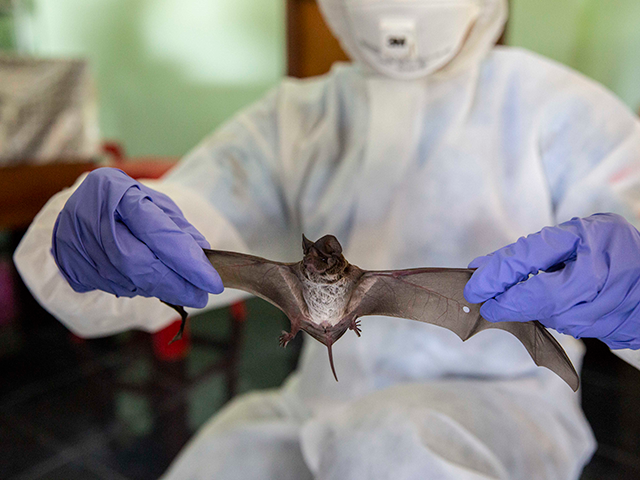The National Institutes of Health (NIH) stripped China’s Wuhan Institute of Virology (WIV) of its eligibility to receive American taxpayer funding for animal experiments, public health advocates confirmed this week.
The facility, at the heart of investigations into the origins of the novel coronavirus that began spreading in the city of Wuhan in late 2019, appeared on the list of “Institutions with a PHS Approved Animal Welfare Assurance” as recently as late April, the taxpayer watchdog group White Coat Waste Project (WCW) noted on Wednesday, after confirming with the NIH that it had been removed.
🎉VICTORY🚨 We just uncovered that the NIH has DISQUALIFIED the Wuhan animal lab from tax $ following a 3 year WCW campaign!
✂️💸🇨🇳🦠🦇🐭🧪☠️🛑
Stop the money. Stop the madness!https://t.co/4nhLZSePJb
— White Coat Waste Project 🥼🗑️ (@WhiteCoatWaste) May 17, 2023
The institute does not appear on the list of approved facilities at press time.
The Wuhan Institute of Virology, one of China’s most prestigious infectious disease research facilities, was known to be studying bat coronaviruses in 2019 and seeking funding for studying “enhanced” variants of coronaviruses found in nature but not known to infect humans at the time. An investigation into the origins of the ongoing Wuhan coronavirus pandemic by the World Health Organization (W.H.O.) in 2021 absolved the WIV but found no evidence of the existence of SAR-CoV-2, the virus that causes Wuhan coronavirus disease, in nature, leading many — including W.H.O. Director-General Tedros Adhanom Ghebreyesus — to question the thoroughness of the report. W.H.O. experts have since called for more investigations into any possible role the WIV may have played in the pandemic.

In a nearly 300-page report published this week, Sen. Marco Rubio (R-FL) compiled detailed circumstantial evidence that a “serious biocontainment failure or accident” occurred at the WIV in 2019, potentially the escape of an enhanced bat coronavirus that would later become known as SARS-CoV-2.

The official position of the Communist Party of China is that the Wuhan coronavirus pandemic began in a U.S. Army facility in Maryland and American officials hid coronavirus cases by misdiagnosing them as lung injuries caused by e-cigarettes, or vapes. Beijing has yet to present any evidence for this theory or explain how no evidence exists of a single health worker treating false lung injuries becoming infected with the highly contagious Wuhan coronavirus.
To receive funding from the U.S. Public Health Service (PHS) for any scientific activity involving animals, laboratories and other institutions must receive a certification that the site abides by a list of behaviors and uses specific protocols to ensure the safety and dignity of the animals used.
“No activity involving animals may be conducted or supported by the PHS until the institution conducting the activity has provided a written Assurance acceptable to the PHS, setting forth compliance with the Policy,” NIH explains on its website. “Institutions must have an Assurance on file with OLAW [the NIH Office of Laboratory Animal Welfare] to receive PHS funding.”
The Washington Times independently confirmed with the NIH that the Wuhan facility had lost its place on the list, but the government agency refused to explain why, stating NIH “does not discuss the review process” publicly.
The NIH website notes that, in addition to the approved facilities on the animal welfare list, those facilities may choose “conduct the animal activities at a secondary institution,” resulting in “indirect funding.”
Finally, the NIH has disqualified the Wuhan Institute of Virology from receiving any more of our taxpayer dollars!
This #CCP lab was responsible for releasing COVID upon the world, and its only right that we no longer fund this corrupt institution. https://t.co/mrHWNVp8dW
— Rep. Dan Newhouse (@RepNewhouse) May 18, 2023
“In this case, the secondary institution(s) must be named as a performance site by the prime awardee institution,” the website explains. “After approving the performance site, the funding component will contact OLAW to negotiate an Assurance with the secondary institution(s).”
It does not detail if a performance site that has previously lost approval is eligible for “indirect funding.”
The revelation that the WIV had been stripped of animal welfare approvals nonetheless elicited “cautious” optimism toward the NIH’s oversight, or lack thereof, of the institutions it funds.
“China’s state-run Wuhan Institute of Virology, which was known to be unsafe, should never have received U.S. support for its dangerous experiments on bat coronaviruses,” Sen. Joni Ernst (R-IA), who has advocated for defunding the WIV, said in a statement emailed to the press on Wednesday. “While I am cautiously optimistic that the removal of WIV from the list of labs eligible to receive funding could be a victory for taxpayers, the incident has exposed a huge loophole in the law that is allowing untold sums of U.S. dollars to be secretly spent in institutions in China and elsewhere.”
“Which raises the question: What other batty studies are we paying for that are flying under the radar?” the senator asked. “I soon plan to introduce legislation requiring every penny sent to an institution in China or any other adversarial country be publicly disclosed.”
Breitbart: Rubio’s extensive investigation concludes that COVID likely leaked out of the Wuhan Institute of Virology (WIV) in late 2019 before it spread across the world and became the worst pandemic in decades.https://t.co/CWdUderawL
— Senator Marco Rubio (@SenMarcoRubio) May 17, 2023
The senior vice president of the White Coat Waste Project, Justin Goodman, declared the removal of the WIV from the list of approved animal experiment centers a “decisive victory in the War on Waste” in an emailed statement on Wednesday, detailing advocacy efforts by his group to discourage the use of American taxpayers’ dollars to fund “rogue” foreign experiments.
“Taxpayers shouldn’t be forced to fund a foreign lab run by an adversarial nation that wasted money, tortured animals, and engineered superviruses in dangerous gain-of-function experiments that violated the law and likely caused COVID,” Goodman said, using the “stigma-free” W.H.O. name for Wuhan coronavirus infection. “Continuing to ship tax dollars to this rogue animal lab to cook up deadly new coronaviruses is a recipe for disaster.”
Goodman noted that his group would “continue [its] work to ensure this Chinese Communist Party-run animal lab and others like it never receive another red cent of taxpayers’ money.”
BREAKING: New coronavirus gets official name from the WHO: COVID-19. https://t.co/73nTKZYUO3
— NBC Nightly News with Lester Holt (@NBCNightlyNews) February 11, 2020
Investigations into the origin of the Wuhan coronavirus remain inconclusive, in part due to the Chinese government’s intransigence and obstruction in relation to the 2021 W.H.O. investigation and its admitted destruction of critical evidence in the early days of the pandemic, claiming destroying early coronavirus samples was necessary to contain the virus. On Tuesday, Sen. Rubio published one of the most extensive accounts of the Chinese government’s and Chinese scientific community’s known actions throughout 2019, indicating that the WIV potentially suffered a significant security breach with its bat coronavirus experiments.
“Information detailed in this report, including that derived from official Chinese sources, further indicates that a serious biocontainment failure or accident, likely involving a viral pathogen, occurred at the state-run Wuhan Institute of Virology (WIV),” the report details, “approximately during the same period of time in which the available epidemiological evidence indicates that SARS-CoV-2 was introduced to the human population in Wuhan.”
Sen. Rubio’s report notes that many participants in the Military World Games, held in Wuhan in October 2019, fell ill shortly thereafter with symptoms consistent with Wuhan coronavirus.
The senator’s findings are consistent with information in a U.S. State Department fact sheet published in 2021 indicating that “several researchers inside the WIV became sick in autumn 2019, before the first identified case of the outbreak, with symptoms consistent with both [Chinese coronavirus] and seasonal illnesses.” The fact sheet was previously only accessible on the website of the U.S. Embassy in Tbilisi, Georgia, and is now unavailable at that address.
The NIH has attracted growing public criticism for both funding the Wuhan laboratory and failing to properly oversee how those American taxpayers’ dollars were administered. In January, Office of Inspector General (OIG) of the Department of Health and Human Services (HHS) concluded in a report on the NIH that it failed to “effectively monitor or take timely action to address” funding for bat coronavirus research at the WIV obtained through the New York nonprofit EcoHealth Alliance.
“The audit found oversight issues by the National Institutes of Health (NIH), and that the grantee had misreported $90,000 in expenses,” Science magazine noted at the time. The report recommended no longer funding the WIV.
NIH reinstated a grant to EcoHealth Alliance to study bat coronaviruses in May on the condition that the group not work with the WIV or conduct any research in China at all, among other conditions.




